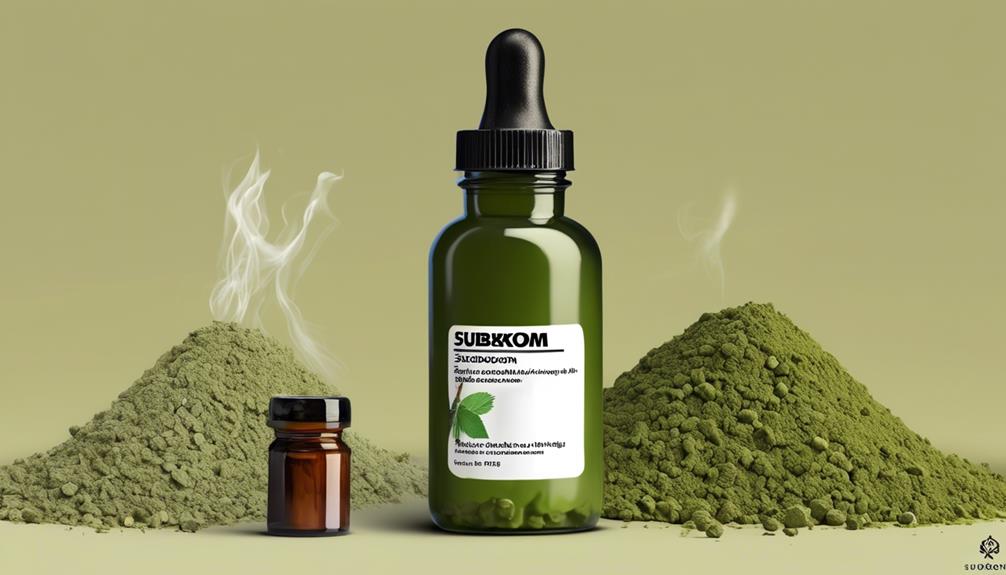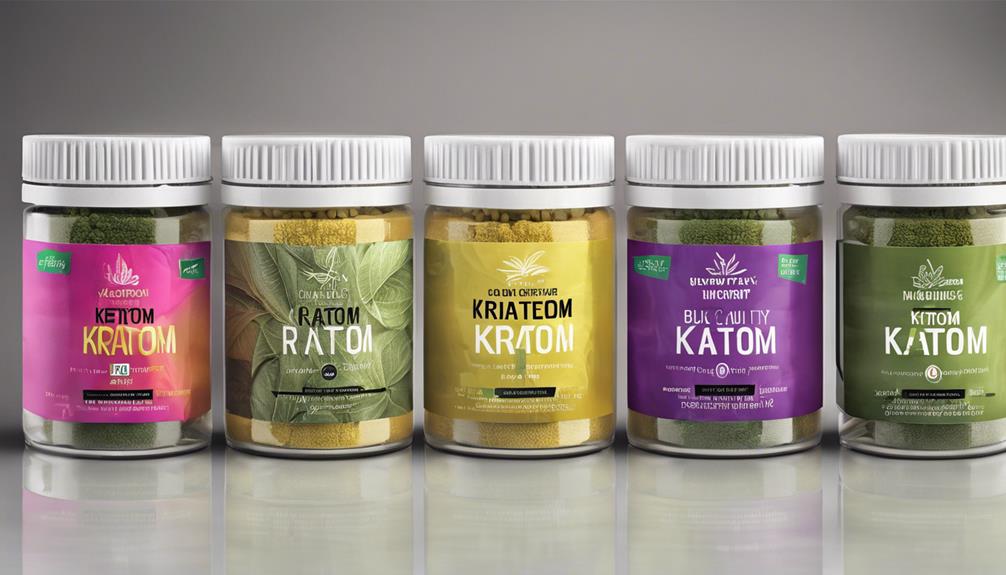Are you struggling with kratom dependence and wondering if Suboxone could be a potential solution? The effectiveness of Suboxone for kratom dependence is a subject of interest and debate within the medical community. While some individuals have reported success in using Suboxone to manage their kratom withdrawal symptoms, there are also potential risks and controversies surrounding this approach. In this discussion, we will explore the effectiveness of Suboxone for kratom dependence, the potential risks involved, and compare it to the use of kratom itself. Join us as we delve into the complexities of managing kratom dependence and the role Suboxone may play in this process.
Effectiveness of Suboxone for Kratom Dependence
Suboxone has shown promising effectiveness in managing kratom dependence, offering hope for individuals struggling with this addiction. Research has found that buprenorphine-naloxone maintenance, also known as Suboxone, can effectively control opioid withdrawal symptoms in patients with kratom dependence. This is significant because kratom use disorder can lead to severe withdrawal symptoms, making it challenging for individuals to quit on their own.
Studies have supported the potential of Suboxone in not only managing kratom dependence but also addressing underlying chronic pain. Many individuals with kratom dependence also suffer from chronic pain, and Suboxone has been found to effectively manage both conditions. This dual benefit can greatly improve the quality of life for individuals struggling with kratom addiction.
Furthermore, successful transitions from kratom to Suboxone maintenance have been reported, highlighting the potential of Suboxone in treating kratom dependence. Patients experiencing withdrawal symptoms have been able to find relief and stability through Suboxone treatment, providing a path towards recovery.
Although Suboxone has shown promise, further research is needed to fully understand its efficacy in treating kratom dependence. Continued studies will help establish optimal dosage protocols and identify potential side effects or limitations of Suboxone treatment for kratom addiction.
Potential Risks of Using Suboxone for Kratom
When considering the potential risks of using Suboxone for kratom, it is important to address the concerns surrounding its use in combination with other opioids. Suboxone contains buprenorphine, an opioid agonist, which can trigger withdrawal symptoms if taken with other opioids, including kratom. This is due to its ability to bind to the same opioid receptors in the brain.
Using Suboxone for kratom may also pose a risk of addiction. Both substances have opioid-like effects on the body, and the misuse of Suboxone can lead to dependence. It is crucial to recognize that Suboxone is a medication used to help individuals manage their addiction and withdrawal from opioids, and using it for kratom addiction without medical supervision may lead to unintended consequences.
Furthermore, combining Suboxone and kratom can increase the risks of respiratory depression and overdose. Both substances have the potential to depress the central nervous system, and when used together, their combined effects can be dangerous.
It is important to note that the FDA has not approved Suboxone for treating kratom dependence. The use of Suboxone for this purpose lacks established evidence-based consensus. Therefore, the potential risks of using Suboxone for kratom include the lack of therapeutic evidence for kratom and the uncertainty of its efficacy and safety when used in combination with Suboxone.
If you are considering Suboxone as a potential treatment for kratom addiction, it is essential to consult with a healthcare professional who can provide guidance and support. They can help you explore alternative treatment options and create a personalized plan that addresses your specific needs. Remember, seeking professional help is a crucial step towards recovery and ensuring your safety.
Controversy Surrounding Suboxone for Kratom

Controversy surrounds the use of Suboxone for kratom treatment, with concerns raised about its efficacy and potential risks. While some experts advocate for the use of Suboxone to treat opioid withdrawal symptoms and kratom dependence, others question its effectiveness and safety.
One of the main points of contention is the classification of kratom as an unregulated herbal supplement. Some argue that using a prescription medication like Suboxone for kratom dependence is excessive and unnecessary. They believe that alternative treatments, such as counseling or support groups, should be explored before resorting to medication.
Another source of controversy is the use of Suboxone as a partial opioid agonist. While this medication can help alleviate withdrawal symptoms and reduce cravings, it also carries the risk of respiratory depression. Critics argue that substituting one opioid for another may not be the most effective approach to treating kratom dependence.
Furthermore, there is a lack of consensus among healthcare professionals regarding the use of Suboxone for kratom addiction. Some studies suggest that Suboxone can be beneficial in managing chronic pain and reducing kratom use, while others highlight the potential for misuse or addiction to Suboxone itself.
It is important to note that ongoing research is being conducted to better understand the role of Suboxone in treating kratom dependence. As more evidence becomes available, the controversy surrounding its use may be clarified. In the meantime, it is crucial for individuals seeking treatment to consult with a healthcare professional who can provide personalized guidance and support.
Comparison of Suboxone and Kratom for Dependence
To understand the comparison between Suboxone and kratom for dependence, it is important to consider their mechanisms of action and regulatory status. While both Suboxone and kratom activate opioid receptors, there are significant differences in their approval and regulation.
Here is a comparison of Suboxone and kratom for dependence:
- Regulatory Status:
- Suboxone: Suboxone is FDA-approved for the treatment of opioid addiction. It is considered a safe and effective medication for managing withdrawal symptoms and preventing relapse.
- Kratom: Kratom products are not regulated or approved by the FDA for any medical use. The legality of kratom varies across the globe, with some countries banning its use due to safety concerns.
- Effectiveness in Treating Dependence:
- Suboxone: Suboxone, containing buprenorphine and naloxone, has been proven effective in controlling opioid withdrawal symptoms and reducing cravings. It is commonly used in medication-assisted treatment programs.
- Kratom: While some individuals claim that kratom helps with opioid withdrawal symptoms, there is limited scientific evidence to support its effectiveness. More research is needed to determine its potential as a treatment for opioid addiction.
- Safety and Addiction Potential:
- Suboxone: Suboxone contains naloxone, an opioid antagonist that discourages misuse and reduces the risk of overdose. It is considered a safer alternative to illicit opioids.
- Kratom: Kratom has opioid agonist and stimulant properties, making it potentially addictive. There have been reports of kratom dependence and withdrawal symptoms, suggesting a risk for addiction.
- Availability and Therapeutic Evidence:
- Suboxone: Suboxone is available through Medication-Assisted Treatment programs with a doctor's prescription. It has undergone rigorous clinical trials and has a substantial body of evidence supporting its efficacy.
- Kratom: Kratom lacks extensive research and therapeutic evidence. It is illegal in many European countries and its safety and efficacy are not well-established.
Can Suboxone be used as a treatment for Kratom addiction?
Yes, Suboxone can be used as a treatment for Kratom addiction. However, it’s important to consult a medical professional for individualized guidance. In the meantime, natural kratom samples available can be helpful for those seeking alternative solutions.
Managing Kratom Withdrawal With Suboxone

Suboxone, a combination of buprenorphine and naloxone, can effectively alleviate kratom withdrawal symptoms and support individuals in managing their dependence. If you find yourself struggling with kratom withdrawal, Suboxone may be a helpful treatment option for you. Research has shown that buprenorphine-naloxone maintenance, which is the active ingredient in Suboxone, has been successful in controlling opioid withdrawal symptoms in patients with kratom dependence.
Suboxone is an FDA-approved medication for Opioid Use Disorder (OUD), and it can be used to treat kratom dependence as well. While the legality of kratom varies, Suboxone is available through Medication-Assisted Treatment (MAT) with a doctor's prescription. This means that you can work closely with a healthcare professional to determine the appropriate dosage and length of treatment for your specific needs.
When it comes to managing kratom withdrawal, Suboxone can provide relief. Kratom withdrawal symptoms typically occur within 12 to 48 hours after the last dose and are described as moderate. By taking Suboxone as prescribed, you can minimize the discomfort associated with withdrawal and avoid the urge to use kratom or other opioids to alleviate the symptoms.
It's important to note that Suboxone, when misused with other opioids, may trigger withdrawal symptoms. Therefore, it's crucial to follow your doctor's instructions and use Suboxone as part of a comprehensive treatment plan. Remember, seeking help for opioid addiction is a courageous step towards recovery, and with the right support and treatment, you can successfully manage your kratom withdrawal and move towards a healthier, more fulfilling life.
Is Suboxone an Effective Treatment for Kratom Addiction and Detox?
Yes, Suboxone can be an effective treatment for kratom addiction and detox. It can help manage withdrawal symptoms and cravings, making the detox process more manageable. If you or someone you know is struggling with kratom addiction, there are kratom detox centers information available to provide the necessary support and guidance.
Can Suboxone Be Used as a Treatment for Kratom Dependency?
Suboxone can be used as a treatment for Kratom dependency. It helps in managing withdrawal symptoms and cravings. The reserve extracts benefits understanding of addiction treatment options, including the use of Suboxone to support individuals struggling with Kratom dependency.
Frequently Asked Questions
Are There Any Alternative Treatments for Kratom Dependence Besides Suboxone?
Are you looking for alternative treatments for kratom dependence? There are several options to consider. Natural remedies, such as herbal supplements, may help manage withdrawal symptoms. Behavioral therapies, like cognitive behavioral therapy, can address the underlying causes of addiction. Support groups provide a sense of community and understanding. Holistic approaches, like mindfulness and meditation, promote overall well-being. Non-opioid medications may be prescribed to help with dependence. Lifestyle changes, such as exercise and healthy habits, can support recovery. Remember, finding the right treatment for you is important, so consult with a healthcare professional.
Can Suboxone Be Used to Treat Other Types of Substance Dependence?
Suboxone, a medication commonly used for opioid dependence, has shown efficacy in treating various types of substance dependence. When comparing Suboxone and methadone, studies suggest that Suboxone may be a more suitable long-term treatment option for addiction. It has been found to reduce withdrawal symptoms during detoxification and can be administered in different dosages depending on the type of substance dependence. Suboxone therapy, when combined with behavioral therapy, has been shown to have positive psychological effects and can serve as a harm reduction strategy for individuals seeking help with substance dependence.
How Long Does It Typically Take to Taper off Suboxone for Kratom Dependence?
When tapering off Suboxone for kratom dependence, it typically takes some time to find the right dosage that works for you. Success rates can vary, but with proper psychological support and counseling, you can increase your chances of overcoming addiction. It's important to consider the long-term effects of Suboxone use and potential drug interactions. Withdrawal symptoms during the tapering process may occur, but with the right support, you can manage them. Remember, Suboxone can help with cravings and relapse prevention, so stay committed to your recovery journey.
Are There Any Potential Side Effects of Using Suboxone for Kratom Dependence?
Using Suboxone for Kratom dependence can have potential risks and side effects. It's crucial to consider the withdrawal symptoms, effectiveness comparison, long-term effects, and dosage recommendations. Medical supervision is necessary to ensure safety and proper management. Success stories show that with the right support and psychological impact, Suboxone can be a helpful tool in overcoming cravings. Combining it with therapy can further enhance recovery. Remember, everyone's journey is unique, so it's important to find a personalized approach that works for you.
Is It Safe to Use Suboxone for Kratom Dependence While Pregnant or Breastfeeding?
Using Suboxone for kratom dependence while pregnant or breastfeeding raises concerns about the long-term effects on infants' development during pregnancy. It's important to consider the effectiveness of Suboxone in treating kratom dependence, along with the risks and benefits of using it while breastfeeding. Comparisons with other medications for kratom dependence can help make an informed decision. Psychological support during Suboxone treatment is crucial for individuals. Safe dosage guidelines for pregnant or breastfeeding women with kratom dependence should be followed, considering potential interactions with other medications. Success rates and medical recommendations can provide further guidance.










